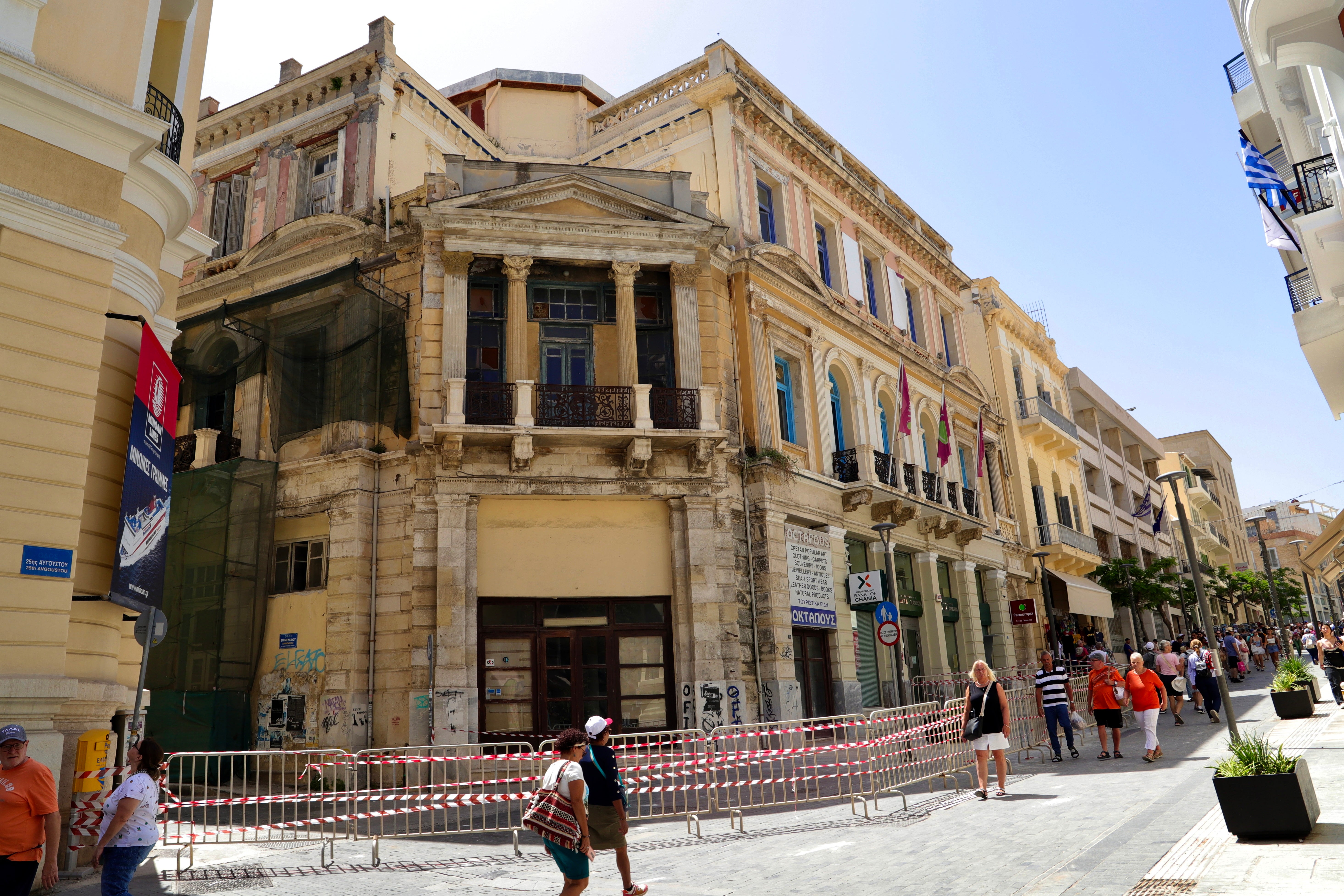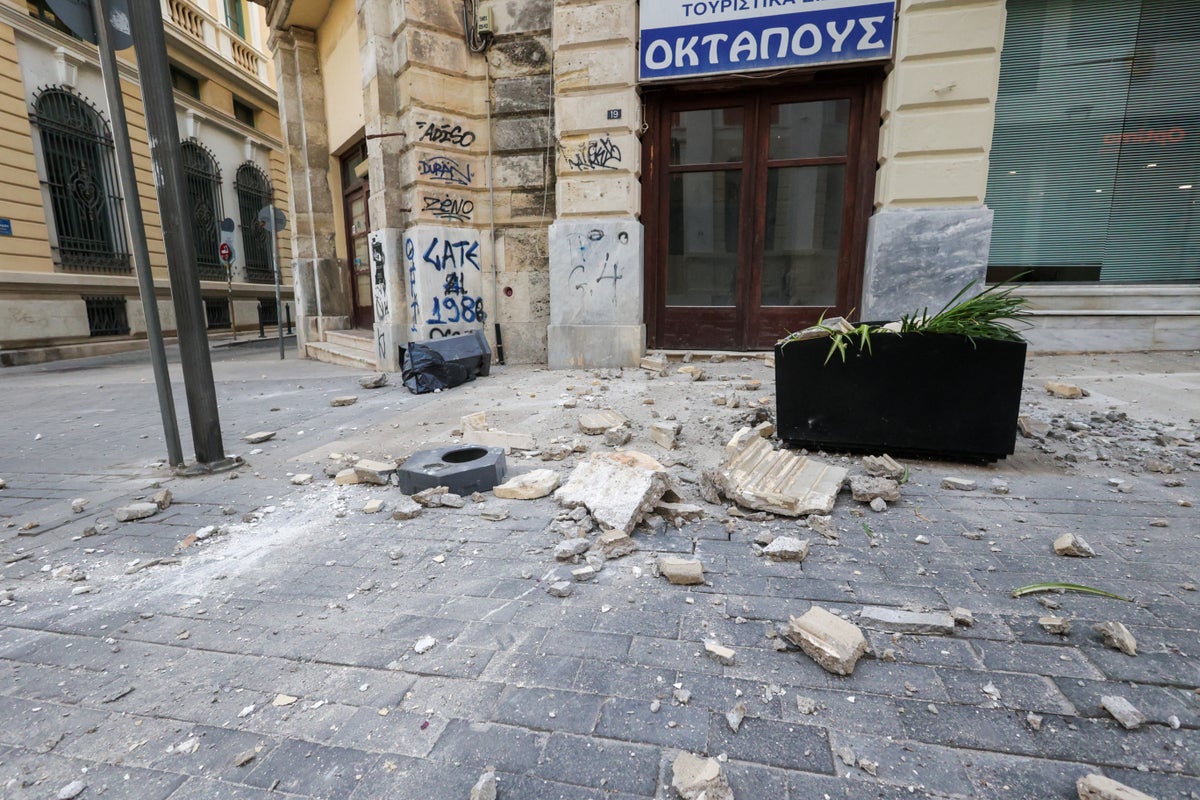From reproductive rights to climate change to Big Tech, The Independent is on the ground when the story is developing. Whether it’s investigating the financials of Elon Musk’s pro-Trump PAC or producing our latest documentary, ‘The A Word’, which shines a light on the American women fighting for reproductive rights, we know how important it is to parse out the facts from the messaging.
At such a critical moment in US history, we need reporters on the ground. Your donation allows us to keep sending journalists to speak to both sides of the story.
The Independent is trusted by Americans across the entire political spectrum. And unlike many other quality news outlets, we choose not to lock Americans out of our reporting and analysis with paywalls. We believe quality journalism should be available to everyone, paid for by those who can afford it.
Your support makes all the difference.
Read more
Aftershocks have continued through the day after a powerful magnitude 6.1 earthquake occurred north-east of Crete on Thursday morning.
The powerful earthquake struck off the coast of Crete at 6:19am local time (3.19am GMT), according to the German Research Centre for Geosciences.
No injuries or major damage have been reported, but popular tourist spots the Samaria and Imbros gorges remained closed throughout Thursday as a precaution.
Seismologist Gerasimos Papadopoulos said on social media there would be some additional aftershocks through the day, “but they are all harmless”.
“Fortunately, the depth and distance from the island became a shield of protection again,” he said in a translation of his post.
The quake was felt across the Aegean Sea, reaching parts of Turkey and north Africa.
Shortly after the quake tourists were urged to “move away from the coast” after the tremors led to warnings of a possible tsunami in Greece and beyond – though the head of Greece’s Earthquake Planning and Protection Organisation said this was unlikely.
Crete is a seismological hotspot and while most quakes are mild, stronger ones – such as the deadly 2021 earthquake also centred near Crete – have caused damage in the past.
Athena Stavrou22 May 2025 22:14
Geologists have explained the science behind the impact of today’s earthquake.
Charalambos Fasoulas, a geologist from the Natural History Museum of Crete said these earthquakes “do not usually give many and large aftershocks.”
He wrote on social media: “Usually these earthquakes are “solitary” and have no other consequences on the upper crust.
“They are earthquakes with which both we and our buildings must learn to live.””
Athena Stavrou22 May 2025 21:31
Efthymios Lekkas, head of Greece’s Earthquake Planning and Protection Organisation, said the earthquake’s location at sea and its significant depth have made a tsunami unlikely.
According to the Greek daily Ta Nea, Mr Lekkas explained that the earthquake occurred at a significant depth, making it less likely to cause severe surface damage.
He said the earthquake struck at the junction of the African and European tectonic plates.

(Reuters)
Vasilis Karastathis, the director of the Geodynamic Institute, also told OPEN television: “We were expecting a revised solution to come out, it is 60 kilometres deep and does not pose a danger at such a depth and so many kilometres away from Lasithi and the coast.”
“There is no problem. We will also look at the aftershock sequence, but I do not think it will be intense. With these characteristics of the earthquake, we do not expect any aftershock sequence. There is no need to be concerned,” he said.
“When it is large, the depth opens up the distance, which is why it was felt in Attica and was quite large,” he added.
Athena Stavrou22 May 2025 21:01
The mayor of Arkalochori in Crete — one of the worst-hit areas in the devastating 2021 earthquake – said that today’s 6.1 tremor was a “piece of cake” for the residents.
Vasilis Keggeroglou told Creta Post: “The earthquake had intensity but no acceleration and fortunately it had a large focal depth.”
He added: “This earthquake was a piece of cake for us.”
“There are no reports of problems that would lead to the closure of schools. We are continuing as normal,” Mr Keggeroglou said.

Damage from the 2021 earthquake in Arkalochori (AFP via Getty Images)
Arkalochori, a town in central Crete, was at the epicentre of a 6.0-magnitude earthquake in September 2021, which left one person dead and caused widespread destruction.
Thousands were forced into temporary shelters after the infrastructure collapsed in the region. The community of Arkalochori also endured weeks of aftershocks.
Maroosha Muzaffar22 May 2025 20:15
Earthquakes are historically common in Greece, which lies around the boundary of the Eurasian tectonic plate and the Agean Sea plate.
The most recent earthquake over a magnitude 6 was a 6.4 magnitude quake in Lasithi, Crete, in October 2021.
Last Wednesday, a magnitude 5.9 earthquake occurred about 48 kilometres south-east of Kasos, or directly east of Crete.
Athena Stavrou22 May 2025 19:37
Rachel Clun22 May 2025 19:17
There have been multiple aftershocks since a magnitude 6.1 earthquake was felt in Crete on Thursday morning.
Seismologist Gerasimos Papadopoulos said that “they are all harmless”, but the quake is the second strong one to hit Greece within days.
Last Wednesday, a magnitude 5.9 earthquake occurred about 48 kilometres south-east of Kasos, or directly east of Crete.
Mr Papadopoulos said that the recent quakes showed that the lull in earthquake activity experienced around Greece since October 2021 appeared to be over.

(Reuters)
Athena Stavrou22 May 2025 18:40
A magnitude 6.1 earthquake struck off northern Crete at 6.19am local time on Thursday.
The epicentre was 58km northeast of Elounda, at a depth of 69km.
More than 30 aftershocks have been recorded, the strongest being magnitude 3.5.
Authorities report no serious injuries or structural damage.
Some minor landslides and debris were noted, especially near Heraklion.

Tourists walk past a cordoned area with old buildings after an earthquake shook Heraklion in Crete (EPA)
The quake was felt in Turkey, Israel, and Egypt. Its depth likely reduced surface impact.
A tsunami alert was triggered by the European-Mediterranean Seismological Centre. No tsunami occured.
A 5.9 quake last week prompted a similar tsunami warning.
Crete is in a high seismic zone with deadly quakes in recent years.
No travel advisories were issued, but tourists were urged to stay alert and follow official instructions.
Rachel Clun22 May 2025 18:16
Damage following the 6.1-magnitude earthquake has been largely minor, Greek authorities said.
At the University of Crete, images showed ceiling tiles collapsed in the computer department, Greek news outlet To Vima reported.
Staff from the Archaeological Museum of Heraklion said there were only small shifts within exhibits, of a couple of centimetres at most, with minimal damage to the building or its artefacts.
A couple of dilapidated buildings in Heraklion suffered some damage, with stone and plaster falling onto the street.

Some of the damage in Heraklion (Reuters)
Rachel Clun22 May 2025 17:18
Following the 6.1-magnitude earthquake, more than 30 aftershocks have been recorded by the Greek Institute of Geodynamics.
The strongest aftershocks have measured 3.5 on the Richter scale.
Seismologists have told Greek media To Vima that they do not expect significant aftershocks.
Earlier, seismologist Gerasimos Papadopoulos said the aftershocks would continue through Thursday, “but they are all harmless”.
Rachel Clun22 May 2025 16:13
